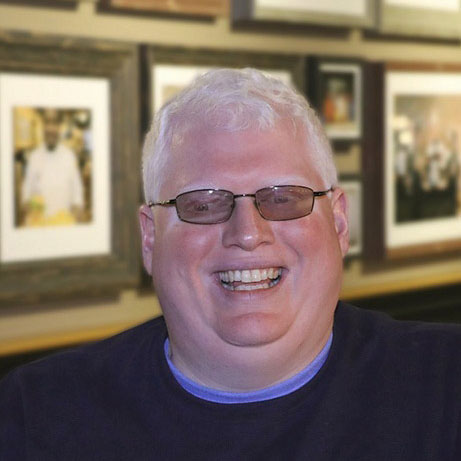Interview with Dave Brown

Every week, we meet with audience members with disabilities who are willing to come forward and share a little bit about their own personal journey and experiences, attending live, in-person, or virtual speaking or training events. Through their unique and generous perspectives, speakers, trainers, facilitators, and other communication professionals can hopefully learn about some of the things that they do well, but also (and maybe more importantly) about some of the things they could improve to provide an experience that is truly inclusive of everyone.
Meet Dave, an audience member who is legally blind
So without further ado, let’s dive right into this week’s interview with Dave Brown (he/him). Dave is legally blind comes to us from Ontario, Canada.
Introductions
QUESTION 01 Can you tell us a bit about yourself, and how your disability might impact your experience, as someone who attends live in-person and virtual events?
I’m an albino. I am legally blind with approximately 10% vision. I am also very light sensitive. It means that reading something on a screen or having a presentation that relies on undescribed or overly complex visuals makes the experience quite disconnected.
Things that ruin the experience
QUESTION 02 Thinking back on some of your experiences attending in-person or virtual events, what are some of the worst things speakers, trainers, and other communication experts can do to ruin your experience as an attendee?
I gave this a lot of thought. There’s one presentation that I attended about described video. The speakers knew they were presenting to a group of blind and partially sighted people. However, their presentation was entirely visual. They passed out handouts with the smallest possible font. Did not have it in accessible alternative formats, and then gave us attitude when was pressed them about it. What it did was immediately kill their credibility and I immediately stopped listening to what they had to say.
Things that make a positive impact
QUESTION 03 Can you share some of the great things speakers, trainers, and other communication experts sometimes do that make a positive impact on your ability to fully enjoy your in-person or virtual event experiences?
I attended the International Mobility Conference in 2015 at Palais du Congres in Montreal. There were a number of excellent presenters over those few days. There’s one that I’ll always remember. It was a presenter from New Zealand talking about using a particular software used for navigation/orientation and mobility. She did utilize video and visual elements in her presentation. However, everything was presented in simple language on the screen in massive fonts. She also made a point to read what was on screen verbatim. Any video element she played was pre-described and featured appropriate sound. It was immersive, it was inclusive, and it was one of the best presentations I’ve ever attended.
Sharing a piece of advice
QUESTION 04 If you had one piece of advice to give speakers, trainers, and other communication experts, so their content became more inclusive of people who have disabilities, what would it be?
If you can, know your audience. If you are speaking to a particular group who represents a particular community, you can tailor what you do to suit their needs. Make sure your technology works. Specifically your audio quality. Have alternative accessible material ready for immediate distribution. Try to keep presentations concise. That doesn’t mean fast, it just means keep it tight. Strip out the extraneous. Think about the venue where you are presenting. As someone who is light sensitive, I appreciate being in a place where less natural light seeps in. Do what you can to keep the lighting comfortable. Not too dark, not too bright.
Wrapping up
QUESTION 05 Thank you for sharing some of your insights with us today. As we wrap up our conversation, is there anything that you’d like to add, such as another thought, another piece of advice, another perspective, etc.?
As we transition back to more in-person events, please keep the virtual events happening. Over the years, I’ve skipped out on a number of events that I’d like to attend because transportation would have been a nightmare. The virtual option is a way to include more people. But even for the in-person events and presentations. Please consider that not all attendees will have a car. And simply being on a public transit route doesn’t necessarily bridge that gap. If I have to take 3 connecting busses, streetcars, or subways to get out to an event in the outskirts of a city, I’m probably not going to go.
Connect with our guest on social
Interested in knowing more about our guest this week? You can follow Dave on Twitter and wake up to his voice every weekday morning on AMI-Audio.

About Denis Boudreau
Denis Boudreau is a consultant, trainer, and speaker specializing in digital accessibility and disability inclusion. He works with organizational leaders who want to equip their teams with the skills to create accessible websites and digital products – so no one is left behind. A Certified Professional in Web Accessibility (CPWA), Denis has trained thousands of web professionals over the past 20+ years and delivered hundreds of workshops in both English and French. He has helped leading brands like Netflix, Salesforce, and Victoria’s Secret embed accessibility into their digital strategies, empowering them to meet legal obligations, improve user experience, and connect with more people, more effectively.
